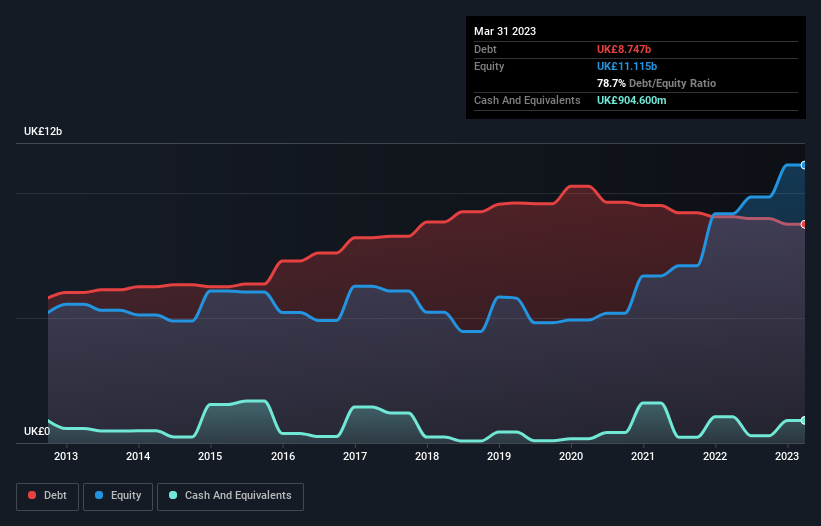
Some say volatility, rather than debt, is the best way to think about risk as an investor, but Warren Buffett famously said that 'Volatility is far from synonymous with risk.' So it seems the smart money knows that debt - which is usually involved in bankruptcies - is a very important factor, when you assess how risky a company is. Importantly, SSE plc (LON:SSE) does carry debt. But the more important question is: how much risk is that debt creating?
When Is Debt A Problem?
Generally speaking, debt only becomes a real problem when a company can't easily pay it off, either by raising capital or with its own cash flow. In the worst case scenario, a company can go bankrupt if it cannot pay its creditors. While that is not too common, we often do see indebted companies permanently diluting shareholders because lenders force them to raise capital at a distressed price. Having said that, the most common situation is where a company manages its debt reasonably well - and to its own advantage. The first thing to do when considering how much debt a business uses is to look at its cash and debt together.
Check out our latest analysis for SSE
What Is SSE's Net Debt?
As you can see below, SSE had UK£8.75b of debt, at March 2023, which is about the same as the year before. You can click the chart for greater detail. However, it also had UK£904.6m in cash, and so its net debt is UK£7.84b.

A Look At SSE's Liabilities
According to the last reported balance sheet, SSE had liabilities of UK£4.76b due within 12 months, and liabilities of UK£11.3b due beyond 12 months. Offsetting this, it had UK£904.6m in cash and UK£2.30b in receivables that were due within 12 months. So it has liabilities totalling UK£12.8b more than its cash and near-term receivables, combined.
This deficit is considerable relative to its very significant market capitalization of UK£17.5b, so it does suggest shareholders should keep an eye on SSE's use of debt. Should its lenders demand that it shore up the balance sheet, shareholders would likely face severe dilution. The balance sheet is clearly the area to focus on when you are analysing debt. But it is future earnings, more than anything, that will determine SSE's ability to maintain a healthy balance sheet going forward. So if you're focused on the future you can check out this free report showing analyst profit forecasts.
In the last year SSE wasn't profitable at an EBIT level, but managed to grow its revenue by 44%, to UK£12b. With any luck the company will be able to grow its way to profitability.
Caveat Emptor
Despite the top line growth, SSE still had an earnings before interest and tax (EBIT) loss over the last year. To be specific the EBIT loss came in at UK£554m. When we look at that and recall the liabilities on its balance sheet, relative to cash, it seems unwise to us for the company to have any debt. Quite frankly we think the balance sheet is far from match-fit, although it could be improved with time. However, it doesn't help that it burned through UK£322m of cash over the last year. So suffice it to say we do consider the stock to be risky. The balance sheet is clearly the area to focus on when you are analysing debt. But ultimately, every company can contain risks that exist outside of the balance sheet. To that end, you should learn about the 3 warning signs we've spotted with SSE (including 2 which are significant) .
Of course, if you're the type of investor who prefers buying stocks without the burden of debt, then don't hesitate to discover our exclusive list of net cash growth stocks, today.
New: Manage All Your Stock Portfolios in One Place
We've created the ultimate portfolio companion for stock investors, and it's free.
• Connect an unlimited number of Portfolios and see your total in one currency
• Be alerted to new Warning Signs or Risks via email or mobile
• Track the Fair Value of your stocks
Have feedback on this article? Concerned about the content? Get in touch with us directly. Alternatively, email editorial-team (at) simplywallst.com.
This article by Simply Wall St is general in nature. We provide commentary based on historical data and analyst forecasts only using an unbiased methodology and our articles are not intended to be financial advice. It does not constitute a recommendation to buy or sell any stock, and does not take account of your objectives, or your financial situation. We aim to bring you long-term focused analysis driven by fundamental data. Note that our analysis may not factor in the latest price-sensitive company announcements or qualitative material. Simply Wall St has no position in any stocks mentioned.
About LSE:SSE
SSE
Engages in the generation, transmission, distribution, and supply of electricity.
Undervalued with proven track record.


